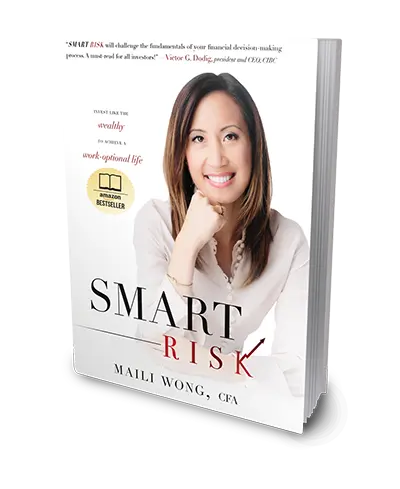TELUS Talks | How to take smart risks with your money: Maili Wong
Financial worries are top of mind for many Canadians amidst the COVID19 crisis, and Maili Wong was invited by TELUS Talks to provide insights about financial health and money, amidst the current crisis. Maili compares the current economic climate with financial crises of the past and explains how you can take a “smart risk” approach to your investments.
To learn more, please email us at thewonggroup@wprivate.ca or call us at 778 655 2410.
I’m Tamara and this is TELUS Talks with Tamara Taggart.
We’re bringing together experts, thinkers, and leaders, busting myths, sharing stories, and staying connected when Canadians need it the most. We’re having unexpected conversations for unprecedented times. The opinions and recommendations in this podcast reflect those of Maili Wong and hers only and not TELUS.
Maili is an investment advisor. For financial advice, please contact your advisor.
Tamara:
Hi, Maili, how are you?
Maili:
Doing great, Tamara, thank you.
Tamara:
Good.
Maili:
How are you?
Tamara:
I’m pretty good. I know you’re working from home these days. What does that look like for you?
Maili:
Well, it’s a big change. I’m used to being in an office with my entire team and we are now all working remotely from our homes, and for me, it’s a big change. I’ve got my two kids also at home with school out, and my husband as well, and so I’m learning how to keep the door closed and try to keep it locked, but there are a few video conferencing calls that come in where my seven-year-old comes running out and you just have to adapt. (laughs)
Tamara:
Yeah, I think we’re all learning how to adapt. And I gotta tell you, when I’m watching the news and reading the news and watching what’s happening with the stock market, and I’ve known you for a few years now and I really trust your opinions, and you’re really good at navigating through some of this stuff. So when we’re looking at what’s happening with the stock markets and people’s savings and retirement funds and all that sort of stuff, it’s really scary. It’s just another added stress, money is right now. What are you telling your clients right now?
Maili:
Right, it is. You’re absolutely right, Tamara. It’s a really challenging time for all of us. As advisors, portfolio managers, we’re doing our very best to provide leadership for our clients, balancing both the incoming calls from scared and confused clients, and also trying to be proactive and thinking about some of those retirees who may be at home scared, lonely, and not sure who to call. So it’s a bit of proactively trying to make sure that one, people are physically okay first, just checking in, making sure that they have what they need. This is an unprecedented health crisis where that comes and helps kind of bring to the forefront all these fears about our vulnerability. And so it’s really about first checking in if people are okay, and then addressing some of the fears and concerns about, as you point out, the stock market or just their ability to have access to their cash because of all the noise and the reports that you hear out there of businesses closing down. It can create a lot of fear and uncertainty. And so we’re just really trying to help clients sort through that, find calm, and find a way forward.
Tamara:
It feels particularly painful, I think, when the majority of us are not rich. We are just barely scraping by. Maybe we worked for companies where we were able to put some money away into RSPs or into a pension of some sort, and now we’re watching everything just plummet. And what I’ve noticed is a leader of a country can say one thing, and all of a sudden, everything just falls immediately. How do we find comfort or just not stress constantly about watching this up and down pattern with our money?
Maili:
That’s a very good point. I think part of it is feeling that there’s this loss of control, right? And I think that’s where sometimes the simplest thing is to not take action and not react to the fear and the anxiety that’s bombarding us through the news, to not necessarily hit the panic button and sell everything in your investment portfolio. It can be really hard not to do that, but time and time again, as we’ve been through so many of these crises before, whether it’s the most recent one that we can remember in the great financial crisis in 2008 and 2009, or years before that in 2001 where there were the first terrorism attacks in the United States. And going back even further from that and just realizing that, over time, things do recover and people get back to their daily lives. And so resisting the urge to necessarily take too much of a reactive sell everything approach can actually be the best course of action to actually not take action. So I think it’s hard in the moment, but that’s where having a good companion, a good advisor, someone who can help you stay more stabilized from a psychological standpoint and also from a financial standpoint can really help get through these turbulent times.
Tamara:
If somebody doesn’t have someone who is advising them financially, is now an okay time to reach out to somebody? What if you’ve just never had anybody looking after this? You buy your RSPs with your bank and you don’t really pay attention to it and now all of a sudden you’re paying attention.
Maili:
Yes, no, it was a great time to reach out to someone who could be a trusted strategic advisor to you in terms of financial guidance. Look for someone who maybe your friends or family have leaned on for leadership in the past, who you can trust is going to give you the best advice for your best interest and mind. And I can tell you, you know what? This is the time to really seek out that advice versus being at home isolated at the mercy of your own worst nightmare and trying to make decisions in that kind of chasm. So I think, yes, seeking out professional advice at this time is a really good idea.
Tamara:
Do you think there’s any opportunities right now?
Maili:
Absolutely, in fact, that’s one of the things that we’re spending a lot of time talking to clients about, and we speak about this constantly where, in times of crisis, there are really two sides of the coin, both the danger and the opportunity. And the opportunity is that there’s some really great quality companies that are going to still survive through this economic downturn, still be able to have strong financial situation, we call them balance sheets. There’s companies out there who will be able to survive, and guess what? Their share prices are also trading at big sale prices right now. So there’s actually an opportunity in many cases, even if you already are invested, to do what we’re suggesting and that is switch from low price to low price, but upgrading quality, and position yourself in a good spot for the next chapter. Because I think ultimately, we will get through this, and if we’re in the thick of the storm now, there’s still a lot of uncertainty, but when we look back at this experience years from now, I think we’re gonna look back and see that these were some of the best opportunities had we had the wits about us to take advantage of them.
Tamara:
And I know your dad, your dad also was in the same business that you’re in right now.
Maili:
Yes.
Tamara:
So you’ve learned a lot from your father. And you have this really, I guess you could describe it as an uncommon approach to wealth. So why don’t you talk a little bit about that, this uncommon approach?
Maili:
Sure. I would say that leaning on my dad’s experience, he’s had over five decades of experience investing in the markets, he would always tell me, “Maili, it’s not as bad as back in the ’70s “or bad as when we went through “these hyperinflationary times.” And having that perspective is really helpful, especially going through these tough times. I would say our uncommon approach is that we tend to embrace volatility, look at volatility or all this turbulence as an opportunity for our clients to be in a position where they can actually pick up some of the best quality investments over time, and that way, that they’re actually gonna be in a position of strength when we get through this. Because the markets are kind of like life, right? There’s ups and there’s downs, and when we start to expect these ups and downs as a normal way of life, the same way we approach it with the markets. So that’s where we can, in good times, position portfolios to be prepared for when the tough times come, and so have a little bit of extra defense in the portfolio. And then when the tough times come, like we’re experiencing right now, be ready to act on offense so that when things normalize, the portfolio is in a position of strength. So I call that the smart risk approach. It’s about recognizing that there’s risk in everything that we do, and there’s risks to the upside, there’s risk to the downside, but we try to manage the most likely outcome. And I think that’s where, when we look across the landscape right now, sure there’s still uncertainty, but like Mark Carney, the governor of the Bank of England, he said it’s a short, substantial shock to the system, but it’s temporary. So when we look past this storm, we’ll be back into a period where, guess what? Humans, we are resilient and we want to be able to position ourselves for when that time comes. And at the same time, in the meantime, what we’re telling folks is, hey, let’s stay in the highest quality companies that pay dividends. Dividends are a cashflow that gets paid out by these investments into portfolios, so that even when markets are down, clients are still collecting some cashflow. And guess what? That cashflow can help pay the bills for the next little while. So even if things are still topsy turvy, turn off the TV, don’t pay attention to that fluctuating price, and just collect those dividends while you wait. Get paid to wait for the markets to recover.
Tamara:
Yeah, it sounds good. And I know you advocate for smart risks. You wrote a book about it.
Maili:
Yes, that’s right.
Tamara:
How can we take a smart risk right now? Can you give me an example of that?
Maili:
Sure. So I’d say a smart risk right now is, it always depends on the person’s individual circumstance, but let’s say you’re a working professional and you’ve just faced the fact that you’re working from home now, or maybe you just got laid off and it’s a really challenging time and cashflow is scarce. But you have some savings in an RSP that you’ve been putting away for some time and you don’t plan to touch those RSPs till later. That RSP might be a really great place for you to talk to your financial advisor about perhaps using some of the cash that’s been in the portfolio to put to work in some high quality companies that pay dividends right now. Why? Well, yes, the market’s about 30% off right now. So quality companies that people can go back to after things resume to normal, some companies that are good investments these days have more cash on their balance sheet than even the US government. So they’re in a really good position to be resilient over the next few years. And guess what? Their company’s share prices are now 30% off where they were a month ago. So it can be a smart risk to start moving some of that cash on the sidelines into some of these companies, not necessarily all of it right now, but certainly some of it. And that’s where I liken it to the idea that, for some of us ladies who might enjoy having maybe that designer handbag we’ve been looking at over time and always wanted to get that designer handbag, and imagine that store had a 30% off sale off of everything in the store and it’s that one opportunity to get that handbag now that’s 30% off. And so these are the types of high quality companies that are on sale right now that are typically always expensive. And so it’s almost a generational opportunity to acquire assets that are going to help you get to your retirement goal sooner, faster, and then ultimately put you in a better position for the longterm.
Tamara:
Right. Okay, so let’s talk a little bit about comparing what’s happening right now in the financial industry with 2008 and 9/11. How does it compare? Does it compare?
Maili:
It does in a lot of ways. 9/11 in 2001 was a time where terrorism all of a sudden came into the forefront when two planes struck the Twin Towers. And I happened to be in New York at the time when that happened and it was absolutely terrifying. And it was almost like life came to a standstill and you didn’t know up from down. And I think New York City, being the epicenter of where that took place, you saw fear and panic and people were worried about their health. Shortly after the Twin Towers were hit, then this anthrax breakout took place. And we often forget about this because it has been almost 20 years now, but at that time, yes, market sold off, nobody wanted to travel, airlines shares came way down. So there’s a lot of similarities, even the impact to the economy. I think this in a way feels like a little 9/11 happening in all of our communities in the sense the way that we are directly impacted and having to change our behaviors in such a short period of time. And so we’re seeing these same types of behavioral patterns happen in the market, where you see panic selling, you see people worried about the impact on the economy. And what happened in 2001 after the 9/11 attacks is that yes, the economy was negatively impacted, but after about a year and a half or two years, things started to really recover and went on to one of the biggest expansions that we’ve experienced. So it’s sometimes very helpful to lean on past experience.
Tamara:
And what about an 2008, yeah?
Maili:
So 2008 was a very sharp downturn in the economy, but it actually took place over more time. And I think that’s what the difference is, is that today, we’re experiencing a similar drop in the magnitude of the markets, but it’s in a compressed period of time. So it’s been a few weeks, big drop, whereas with ’08, ’09, it was more drawn out. But I think the important thing to remember is that in ’08, ’09, the financial industry was in a very different place. There was a lot more leverage, a lot of great uncertainty whether the system itself would work, the financial system. Today, while there are pockets of leverage that can create problems and people may experience where there still may be pockets of problems in terms of bankruptcies and too much borrowing, overall, the system is not in the same way at risk and we can lean on the playbook that we’ve seen that was part of the solution back in ’08, ’09. And that’s where you’re seeing responses from the US government, the Canadian government, governments around the world and central banks around the world that are putting in place programs that they came out with in ’08, ’09, which took months to develop. Today, they’re able to now kind of throw that entire playbook into the forefront to try to stem or try to prevent some of the prolonged downturn we saw in ’08, ’09. And so that is a positive because we may see more central bank response, more fiscal and more monetary response to this crisis based on what we learned from ’08, ’09.
Tamara:
You talk a lot about financial purpose.
Maili:
Yes.
Tamara:
So how do we find our purpose during a crisis?
Maili:
So our financial purpose is something that is a guiding post to how we prioritize what we want our money to do for us. And it’s one of the five guideposts that I talk about in my book, “Smart Risk: “Invest Like the Wealthy to Achieve a Work-Optional Life.” It’s a guidepost that is an enduring guidepost. So it’s important that even in times of crisis like this, that we don’t lose sight of that. So first and foremost, safety, right? I think in terms of establishing what our purpose financially is, we all may have different longterm goals, but in the short term, it’s about safety, and it’s about making sure we have enough of a financial safety net to get through the next, say, six months. So that’s where it’s good to take stock of, okay, what access do we have to cashflow for the next six months? Where are we exposed? What types of programs are in place to perhaps give us some flexibility in the near term i.e. mortgage deferrals, line of credit, talking to the bank about giving us a bit of a deferment on the line of credit payments. And so the good news is that these are available right now, and I know of clients who’ve been able to negotiate for six months sort of deferment of their mortgage payments just to get over the next little while.
Tamara:
Can I ask you something about that? Now my understanding, and I don’t know if this is true or not, but somebody mentioned this to me, that if we do defer our mortgages and say we defer it for three months or six months, that when that three months is up or that six months is up, then all of that money is due at the same time. Is that true? Do you know?
Maili:
In some cases. So I think it’s still very case by case. We’re sort of in this state of flux where the programs are being announced, but it’s basically case by case in terms of how they’re being implemented. I have heard of that, yes. I’m also aware that when the payment is due, there’s interest owed on the entire amount that’s been deferred.
Tamara:
Oh boy. See that’s the fine print I guess, right? That’s the fine print, ’cause if that happened to our family, like if I didn’t read the fine print, and I’m assuming that other families are the same, and that happened in three months or six months, I would be in so much trouble. So I guess the lesson is, isn’t it, Maili, is that you really have to comb through all the fine print, and if you’re not able to do that yourself, which some of us aren’t, we find it really boring, sorry, no offense, and that’s when we can go to somebody who is an expert and get their opinion of what is gonna work best for our families, right?
Maili:
Absolutely. And having a look through with either your trusted circle of people, right, a financial professional who can understand the fine print and help communicate it in a clear way is really important, because we don’t want you to say yes to something that sounds great, but in the end is not gonna put you in any better position.
Tamara:
Or put you in a worse position really.
Maili:
Yes, that’s true, yeah.
Tamara:
Yeah. Okay, so Maili, let me ask you this. As we wrap things up, do you have three tips or three things for us to keep in mind when it comes to our finances or our investments as we’re all navigating through this crisis at the same time?
Maili:
Right. Absolutely, I’d say first of all, recheck your plan, your financial plan. What did you have in place before this crisis? Where are you now exposed in the crisis, and what are your priorities for the longterm in terms of what’s gonna get you through this? And not all of us have a financial plan. That’s where now is a really important highlighting factor that, okay, it’s a good time to start to develop one. And that leads me to the second point is that working with a financial professional, a trusted strategic advisor, can help you develop that plan and also help you make good rational decisions in this very emotional time to get you through this. And I guess the third point is stay diversified, stay focused on your immediate and longterm goals, and remember that we’re gonna get through this and it’s a time of challenge right now, but there are opportunities. And if you can stay focused on your goals and not lose sight of the fact that we will get through this, then I think you’re gonna come out and be a stronger, more resilient investor in the end.
Tamara:
Great advice. Thank you so much, Maili, I really appreciate it. Always nice to hear your voice and really good advice. So thank you for joining us on TELUS Talks with Tamara Taggart.
And don’t forget, you can find Maili’s book, “Smart Risk,” at online bookstores, and you can also visit her website at smartriskinvesting.com.
And be sure to join us every Tuesday and Thursday as we speak to all kinds of guests to help support Canadians during the COVID-19 pandemic. Be well.
English (Canada)





